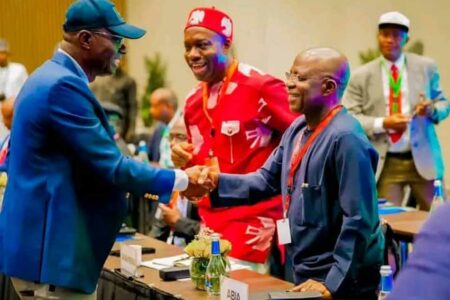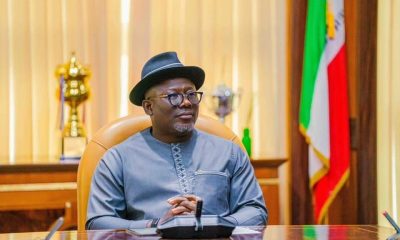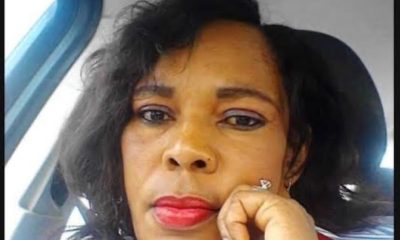Opinion
PLAUDITS FOR OTTI, SOLUDO AND BAGO

By Tunde Olusunle
A video clip which is just about two and half minutes in duration has been trending on the social media in the last few days. It captures the moment top officials of the Abia State government, arrive for a meeting of what could pass as a state executive council meeting, (ASEC), the sub-national variant of the federal executive council, (FEC). The faces of a few of my friends and colleagues indeed stroll past in the short clip. They include Kingsley Agomoh, an Assistant Corps Marshal of the Federal Road Safety Corps, (FRSC) who is on leave-of-absence to help the new administration in Abia and Kazie Uko, my colleague in the old *Daily Times.* Iheanacho Obioma, (we call him *Chomen*), a former federal parliamentarian, also appears in that recording. The curious and discerning will easily know that the venue of that converge is not the designated executive council chambers of Government House, Umuahia.
From the lacquer on the fence of the facility, to the interlocked driveway, and thenceforth to the improvised conference room where the meeting was held, it is obvious this is a private property. I’m indeed told it is the country home of Alex Otti, in Isiala-Ngwa, Abia South senatorial zone. The official address of the governor in Umuahia is probably undergoing renovation. And for Otti that is no reason to negatively impact the course of governance. Each senior Abia State government functionary, secretary to government, chief of staff, commissioner, adviser, technical assistant who walk past in the said video, carried their essentials themselves. They hauled their files, folios, notepads, laptops, handbags, backpacks, to the meeting themselves. There are no squirming, stampeding aides and security details needlessly occupying space, shoving people aside to make way for their principals. And you could see smiles on the faces of some of the officials an attestation to their subscription to the new administrative regimen. Otti, governor of the state himself arrived without fanfare, without ceremony in the said video, holding his mobile phone.
The Alex Otti regime in Abia State is barely one year in office. But the incumbent administration has compelled national attention and admiration to the state for the novel to governance championed by Otti, a former helmsman of the erstwhile Diamond Bank, which has since coalesced into the mega Access Bank. A few months ago, the 141 megawatts *Aba Integrated Power Project, (AIPP),* was commissioned by Nigeria’s Vice President, Kashim Shettima. Reputed to be the first of its kind in Nigeria, it will produce uninterrupted electric power for nine local government areas of the state which is about half the entire Abia State. True it was work-in-progress before Otti’s advent dating back 20 years by the governor’s own admission, the eventual consummation and operationalisation of the initiative was courtesy of the former banker. Critically, the infrastructure will liberate the infinite potentials of Aba, the *Enyimba City* which is the folkloric socioeconomic hub of the state.
Aba’s direct competitor in Nigeria’s South East is Nnewi in Anambra State, an equally vibrant nexus of multilevel entrepreneurial ingenuity. Since he became chief executive of the state two years ago, Chukwuma Soludo the globally recognised economist has worked hard to redefine governance and administration in the state. Soludo came into the job with a virtual truckload of competencies and experience. First, he is a class professor of economics who was called up by the Olusegun Obasanjo/Atiku Abubakar regime to serve first as economic adviser. He was soon after appointed governor of the Central Bank of Nigeria, (CBN), a position from which he superintended over the recapitalisation of Nigerian banks which facilitated their competitiveness in the global financial market. The exercise shrunk the nearly 100 banks, some wobbly and breathless, to 25 solid entities, a process which entailed partnerships and absorptions in many instances.
Soludo signalled his faith in home-made brands when he rode a sports utility vehicle, (SUV) built by the Nnewi-based indigenous vehicle production outfit, *Innoson Motors* to his inauguration in March 2022. The various components of his regalia to his swearing-in ceremony derived from various parts of Anambra State. He inherited a state which had previously assumed worldwide notoriety for large-scale violence. Faceless murderers branded “unknown gunmen” had free reign prawling contiguous streets of communities in the state hunting the innocent like game, in the full glare of the afternoon skies. Abductions, cannibalism, arson were rampant before Soludo’s coming. I had reason in 2021, to engage with the worrying issues in two public discourses, *Unknown Gunmen, November 6 and the Epidemic of Bloodletting* and *Gun Smoke from the East.* It seems the horrendous trends have been on a gradual downward slide, since Soludo’s coming.
Soludo is equally pursuing an aggressive infrastructural development programme. First, he is concerned about congestion in Awka the state capital and Onitsha the commercial capital of the state. His administration is poised to build three new cities. Masterplans for *Awka 2.0,* *Onitsha 2.0* as well as the *Anambra Mixed Industrial City* are being concluded. While those are in the works, Soludo has embarked on a very ambitious road development programme. This encompasses 400 kilometres of roads in the present phase and aims to facilitate seamless commuting by road users. Remediation of failed portions of existing road infrastructure is a regular chore, handled by statutory departments of government and contracting firms. The Soludo government has also been credited with remarkable fiscal prudence, the stuff of the prototype economist.
I began to take studied note of the enterprise of Mohammed Umar Bago the governor of Niger State when I followed his courageous works in the agricultural sector. I was once his guest a few years ago in his Maitama, Abuja home when he was in the House of Representatives. I visited him in company of a mutual friend, Bimbo Daramola who was in the “Seventh Assembly” with Bago. He is a tea aficionado by the way. He is also a dog lover which is a point of mutual convergence between us. Bago began this year by clearing one million hectares of arable land, preparatory to the approaching rainy season. Food security for his constituents is paramount on his agenda. His government has procured a record 500 mega-capacity tractors, as well as irrigation equipment, tillers, water and solar pumps among other accessories, to drive his agricultural vision.
True, Bago ruled against the shipment of truckloads of produce from his state to others earlier this year, in the face of inflation and imminent famine. He is fully cognisant though of the fact that his state has headwind advantage over many others in the country, in the agricultural sector. He is willing to do legitimate, mutually beneficial business. The landmass of Niger State is larger than that of Sierra Leone, by the way. If Niger State was a ravenous python, the belly of the state would effortlessly swallow Gambia and Togo put together! Bago’s administration is willing to partner with other states in agricultural development and exchange which informed the memorandum of understanding, (MOU), signed between Bago and his Lagos State counterpart, Babajide Sanwo-Olu, on behalf of their entities.
Governor Bago has also been unyielding in the battle against sundry criminalities which have held his people helplessly captive over the years. Kidnappings for ransom, routine invasions, occupation of communities by vagrants and wanton banditry, have headlined the security situation in Niger State in recent years. Bago has been at the fore of the mitigation of the situation vis-a-vis increased collaboration with, and support for the security sector in his state. His administration has provided support in terms of motor vehicles and equipments to the various security agencies, to enhance their performance. There is said to be motorised patrol by joint security services which has brought sanity to the state, notably the very important Suleja-Paiko-Minna road.
Bago has also directed the redesignation and remodelling of the moribund *Shiroro Hotel* in Minna as the new *Ibrahim Badamasi Babangida University Teaching Hospital.* The Niger State leader who spots a strikingly luxurious black beard and was a notable banker like the older Alex Otti before his political journey, is redeveloping Minna the state capital, as well as Suleja and Bida into model towns. His fiscal shrewdness evidenced by the fact that he saved N10 Billion from leaking valves within his first four months in office has loosened funds for investment in needy departments of statecraft. Among these is the ongoing construction of roads in all the local government areas of the state to ensure unimpeded movement by commuters and by extension the evacuation of agricultural produce to the secondary markets.
It is instructive that Alex Otti, Chukwuma Soludo and Mohammed Bago belong to different political tendencies, namely: the Labour Party, (LP); the All Peoples’ Grand Alliance, (APGA) and the All Progressives Congress, (APC). What this implies is that if democracy is allowed to grow and fruit without unobtrusive impunity and high-handedness from political high commands, Nigeria can be availed of some of its best across board. Enyinnaya Abaribe the senator representing Abia South for instance, is in the parliament for the fifth successive time for instance. Muscled out of the Peoples’ Democratic Party, (PDP’s) ticket by the immediate past governor of Abia State, Okezie Ikpeazu, Abaribe contested on the platform of APGA and won! Soludo himself had his own share of gravitation from the PDP to the APC before pitching his tent with APGA which ensured his pathway to his present office. Let’s hope that party politics in Nigeria is gradually throwing up some of our best albeit from unanticipated platforms.
Tunde Olusunle, PhD, is a Fellow of the Association of Nigerian Authors, (FANA)
Opinion
CBN under Cardoso and $6.83 Billion balance of payments surplus in 2024 that signals economic resurgence

By Ibrahim Modibbo
Since his appointment as the Governor of the Central Bank of Nigeria, in October 5, 2023, Olayemi Cardoso has continue to bring on board wide-range of macroeconomic reforms, stronger trade performance, and renewed investor confidence in Nigeria’s economy, that were aimed at putting the country back to its economic footing, as a strong economy that is second to none in Africa.
As part of the ongoing reforms, the Central Bank of Nigeria recently announced a Balance of Payments (BOP) surplus of $6.83 billion for the 2024 financial year, marking a decisive turnaround from deficits of $3.34 billion in 2023 and $3.32 billion in 2022, according to a press statement from Mrs Sidi-Ali, Hakama, the Ag. Director, Corporate Communications of the apex bank.
CBN says “the current and capital account recorded a surplus of $17.22 billion in 2024, underpinned by a goods trade surplus of $13.17 billion. Petroleum imports declined by 23.2% to $14.06 billion, while non-oil imports fell by 12.6% to $25.74 billion. On the export side, gas exports rose by 48.3% to $8.66 billion, and non-oil exports increased by 24.6% to $7.46 billion.”
While “remittance inflows remained resilient, with personal remittances rising by 8.9% to $20.93 billion. International Money Transfer Operator (IMTO) inflows surged by 43.5% to $4.73 billion, up from $3.30 billion in 2023, reflecting stronger engagement from the Nigerian diaspora. Official development assistance also rose by 6.2% to $3.37 billion,” the statement added.
Nigeria recorded a net acquisition of financial assets totalling $12.12 billion. Portfolio Investment inflows more than doubled, increasing by 106.5% to $13.35 billion, while resident foreign currency holdings grew by $5.41 billion, indicating stronger confidence in domestic economic stability. Although foreign direct investment fell by 42.3% to $1.08 billion, the overall financial account posted notable gains.
The country’s external reserves increased by $6.0 billion to $40.19 billion by year-end 2024, bolstering its external buffer.
Notably, net errors and omissions narrowed significantly by 79.5% to negative $5.10 billion in 2024, down from $24.90 billion in 2023, reflecting substantial improvements in data availability and capture. This represents a major advance in data accuracy, transparency, and overall reporting integrity.
The 2024 BOP surplus highlights the effectiveness of Nigeria’s ongoing reform agenda. The liberalisation and unification of the foreign exchange market, a disciplined monetary policy approach to managing inflation and stabilising the naira, and coordinated fiscal and monetary measures have all contributed to enhanced competitiveness and investor sentiment.
“The positive turnaround in our external finances is evidence of effective policy implementation and our unwavering commitment to macroeconomic stability,” said the Governor of the Central Bank of Nigeria. “This surplus marks an important step forward for Nigeria’s economy, benefiting investors, businesses, and everyday Nigerians alike,” the statement further noted.
Other notable indicators to building strong economy by this policy include but not limited to a stronger trade performance, particularly in the current and capital accounts, with a surplus of $17.22 billion in 2024, has contributed to the balance of payments surplus. A goods trade surplus of $13.17 billion that will further strengthens the positive trend. The decline in petroleum and non-oil imports also contributes to a more favorable trade balance.
It will noteworthy to note that the CBN’s reforms have increased investor confidence, leading to higher foreign portfolio investment inflows. Portfolio investment inflows more than doubled in 2024, reaching $13.35 billion. This influx of capital indicates a stronger belief in the stability and growth prospects of the Nigerian economy.
The apex bank’s disciplined monetary policy and FX market reforms on the other hand are aimed at managing inflation and stabilizing the Naira, has contributed to a more stable financial system.
The liberalization and unification of the foreign exchange market have led to greater transparency and reduced distortions in the market.
The implementation of an Electronic Foreign Exchange Matching System (EFEMS) further enhances transparency and efficiency in the FX market.
The reforms, including the unification of the exchange rate, have improved Nigeria’s competitiveness and attracted more foreign investment. Testament to this is the clearing of a $7 billion forex backlog which has also boosted the country’s image with foreign investors.
Also, the significant improvements in data availability and capture have led to a marked reduction in net errors and omissions in the balance of payments data. This enhanced data integrity provides a more accurate picture of the country’s economic performance and builds trust with stakeholders.
In conclusion, the combination of strong trade performance, renewed investor confidence, disciplined monetary policy, and improved data integrity, all facilitated by the CBN’s wide-ranging reforms, are key indicators of Nigeria’s economic resurgence. These developments demonstrate the positive impact of the reforms on the nation’s external finances and overall economic stability.
Dr Moddibo, a public analyst, wrote in from Abuja
Opinion
CBN leads financial dialogue with JP Morgan, NGX, others, in pre-spring meetings Forum

By Dr. Ibrahim Modibbo
In anticipation of the International Monetary Fund (IMF) and World Bank Group (WBG) Spring meetings which commenced on Monday, April 21, 2025, the Central Bank of Nigeria (CBN) partnered with J.P. Morgan, the Nigerian Exchange Group (NGX) and Africa Private Capital Association (AVCA) to host a high-profile global forum at Nasdaq MarketSite in New York on Thursday, April 17, 2025, according to press statement by Dr Ibrahim Moddibo.
The forum, titled “The Nigeria Investment Agenda: Pathways for Growth & Global Partnerships,” convened global investors, diaspora leaders, and senior financial stakeholders to examine Nigeria’s macroeconomic prospects and ongoing reform progress.During his commanding address, Governor Olayemi Cardoso outlined his comprehensive reform strategy encompassing monetary tightening, foreign exchange market transparency, and enhanced financial governance.
He emphasized that these initiatives are establishing the foundation for sustainable macroeconomic stability and heralding a new era of transparency and confidence.Governor Cardoso reaffirmed the CBN’s unwavering commitment to rebuilding credibility through orthodox monetary policy, transparency, and consistency.
“We inherited a crisis of confidence but chose a different path. We’re not turning back,” he stated decisively.In a powerful fireside chat between the Governor and Nobel Prize-winning economist Dr. James Robinson, Reverend Richard L. Pearson Professor at the University of Chicago, Governor Cardoso elaborated on his vision to reestablish the CBN as a credible, trusted institution – rooted in domestic excellence and respected internationally.Mr. Muhammad Sani Abdullahi, Deputy Governor for Economic Policy at the CBN, delivered a macroeconomic update highlighting sharp increases in foreign exchange turnover, emerging signs of disinflation, and strengthening external reserves. “With a market-determined exchange rate and a transparent, rules-based policy framework, confidence is gradually being restored in Nigeria’s economy,” he noted.
Welcoming participants to the forum, Dr. Nkiru Balonwu, Adviser to the CBN Governor on Stakeholder Engagement and Strategic Communication, framed the forum as a key moment in the Bank’s broader engagement strategy. “Today is more than a conversation,” she noted.
It’s about opening the books on the CBN’s transformation story under Governor Cardoso – sharing the facts, interrogating the progress, and looking ahead together at what more can be done to build sustainable partnerships and unlock long-term capital,” she explained.
Another key highlight of the event was the panel discussion entitled “Repricing Nigeria: Assessing the Scope for Sustained Change.” Moderated by Gavin Serkin, Founder of New Markets Media & Intelligence, the panel featured global financial luminaries: Joyce Chang, Chair of Global Research at JPMorgan Chase; Jason Rekate, Global Co-Head of Corporate Banking at Citi; Razia Khan, Chief Economist for Africa & Middle East at Standard Chartered; and Ahmad Zuaiter, Co-Founder & CIO of Jadara Capital Partners. Each panelist provided expert perspectives on Nigeria’s investment landscape, noting renewed international interest driven by improved fundamentals, strengthened governance, and clearer policy direction.
The CBN Board and Monetary Policy Committee were represented by US-based diaspora members Mr. Robert Agbede, Prof. Melvin Ayogu, and Dr. Aloysius Ordu, underscoring the Bank’s global engagement and commitment to leveraging Nigerian talent worldwide. Temi Popoola, Group CEO of NGX, moderated the Q&A session, while Dr. Olubukola Akinniyi Akinwunmi, Director of Banking Supervision at CBN, delivered the closing remarks.The forum focused on substantive discussions and future prospects: engaging critical voices, evaluating progress, and identifying requirements for building lasting partnerships and attracting long-term capital. Central to this endeavor is a clear objective: reestablishing the CBN as a credible, trusted institution respected globally and dedicated to excellence at home.
Dr. Ibrahim Modibbo, a public affairs analyst writes from Abuja.
Opinion
Instagram , WhatsApp troubled by antitrust laws

By Sonny Aragba-Akpore
While we are yet to grapple with the fate of Tik Tok which President Donald Trump had asked its parent company Byte Dance of China to divest from it’s American operations or be banned, Meta Group, owners of Instagram and WhatsApp, is troubled over antitrust concerns.
The U.S. Federal Trade Commission (FTC) has taken the group to court over anti competition issues.
Specifically, the FTC wants Meta to divest from its two biggest companies in an antitrust trial that could redefine the future of social media.
And so Meta’s world is troubled as Mark Zuckerberg’s company could be forced to sell Instagram and WhatsApp if it loses the lawsuit that has just begun in the U.S.
The FTC has accused Zuckerberg’s company of having bought both platforms to eliminate competition and maintain a monopoly on social media.
If the court rules against them, it would be a historic blow to the tech giant.
Zuckerberg acquired Instagram in 2012, and then, two years later,(2014) completed his trio by buying WhatsApp.
Facebook is the third leg of the trio and this easily makes the group the largest tech owner in the world.
Although these acquisitions were approved by the FTC itself at that time ,but now this lawsuit seeks to reverse that approval, arguing that the purchase was not for innovation but to “neutralize” emerging rivals like Instagram which was acquired in 2012 and thus take control of the entire market.
The FTC claims that Meta has used its financial muscle to block competition, buying up emerging apps instead of competing with them, and it has been doing this since 2008! Everything is based on 2012 emails where Zuckerberg had expressed concern about Instagram’s rapid growth compared to Facebook’s performance (which was his only app at the time). In those emails, Zuckerberg admitted it was better to buy than to compete. And so he did, acquiring the app years later.
“On the other hand, he also bought WhatsApp, and of course that reinforces the FTC’s accusation. Meta strengthened its control over the digital system, keeping these apps as separate platforms but under the same power structure” analysts reason.
Meta has not denied the purchases, even though it rejects having acted in an anti-competitive way, calling the case a “weak lawsuit that ignores reality,” since they believe they face strong competition from platforms like TikTok, YouTube or X among many other apps.
During the trial, Zuckerberg claimed he bought Instagram for its camera technology, not because the social network was on the rise, but the 2012 messages don’t seem to support that statement very well.
In the likelihood that FTC wins this case, Meta could be forced to sell Instagram, WhatsApp, or both. This wouldn’t necessarily mean an immediate change for users, but it would shift the balance in the digital market, according to experts.
Digital sociologists think that Meta would make it easier to regulate social networks individually by the FTC.
One of the major implications will be on things like content moderation, privacy, or the use of personal data.
“If it gets split, it would be easier for lawmakers, ensuring proper service to users” digital sociologists admit.
There are however fears of who buys if it gets to that .
For instance If a controversial figure like Elon Musk or an investment fund takes control of Instagram, like what happened with Twitter (now X), it’s possible that many users would leave in large numbers for new alternatives that may emerge, like BlueSky.
“But if it falls into the hands of a discreet company, without major visible changes, it’s likely that most people will keep using it as they always have.”
Although Meta does not reveal exactly how much it earns from each app, it is estimated that Instagram generates around $37 million a year, surpassing Facebook’s revenue according to analysts.
“So of course, Zuckerberg’s eagerness to get out of this case is clear: they can’t afford to lose that income because it would be a catastrophe for Meta” another analyst submits.
The expectations are dicey because the court’s decision will not only affect Meta, but could also open the door to more lawsuits against other big platforms for similar monopoly practices. And at a time when the control of social networks is more questioned than ever, this case could define the future of the digital system in terms of free choice and regulations.
Instagram and WhatsApp which were acquired over a decade ago have become social powerhouses and easily the biggest platforms in that genre.
This looming antitrust trial will be the first big test of President Trump’s Federal Trade Commission’s ability to challenge Big Tech.
The lawsuit was first filed against Meta — then called Facebook — in 2020, during Trump’s first term. It claims the company bought Instagram and WhatsApp to squash competition and establish an illegal monopoly in the social media market.
FTC contends that Meta has maintained a monopoly by pursuing CEO Zuckerberg’s strategy, “expressed in 2008: ‘It is better to buy than compete.’ True to that maxim, Facebook has systematically tracked potential rivals and acquired companies that it viewed as serious competitive threats.”
U.S. antitrust laws are enforced by both the FTC’s Bureau of Competition and the Antitrust Division of the Department of Justice. The agencies consult before opening any investigation. The Antitrust Division handles all criminal antitrust enforcement.
The FTC,s Bureau of Competition enforces the nation’s antitrust laws, which form the foundation of a free market economy.
The antitrust laws promote the interests of consumers; they support unfettered markets and result in lower prices and more choices.
The Federal Trade Commission Act and the Clayton Act, both passed by Congress in 1914, give the Commission authority to enforce the antitrust laws.
These laws prohibit anticompetitive mergers and business practices that seek to prevent hard-driving competition, such as monopolistic conduct, attempts to monopolize, and conspiracies in restraint of trade.
The Bureau of Competition investigates potential law violations and seeks legal remedies in federal court or before the FTC’s administrative law judges. The Bureau also serves as a resource for policy makers on competition issues, and works closely with foreign competition agencies to promote sound and consistent outcomes in the international arena.
WhatsApp (officially WhatsApp Messenger) is an American social media, instant messaging (IM), and voice-over-IP (VoIP) service owned by technology conglomerate Meta. It allows users to send text, voice messages and video messages, make voice and video calls, and share images, documents, user locations, and other content.
WhatsApp’s client application runs on mobile devices, and can be accessed from computers.
The service requires a cellular mobile telephone number to sign up.
In January 2018, WhatsApp released a standalone business app called WhatsApp Business which can communicate with the standard WhatsApp client.
The service was created by WhatsApp Inc. of Mountain View, California, which was acquired by Facebook in February 2014 for approximately US$19.3 billion.
It became the world’s most popular messaging application by 2015,and had more than two billion users worldwide by February 2020,confirmed four years later by 200 million new registrations per month.
By 2016, it had become the primary means of Internet communication in regions including the Americas, the Indian subcontinent, and large parts of Europe and Africa.
Instagram is an American photo and short-form video sharing social networking service owned by Meta Platforms. It allows users to upload media that can be edited with filters, be organized by hashtags, and be associated with a location via geographical tagging.
Posts can be shared publicly or with preapproved followers. Users can browse other users’ content by tags and locations, view trending content, like photos, and follow other users to add their content to a personal feed.
A Meta-operated image-centric social media platform, it is available on iOS, Android, Windows 10, and the web. Users can take photos and edit them using built-in filters and other tools, then share them on other social media platforms like Facebook.
It supports 32 languages including English, Hindi, Spanish, French, Korean, and Japanese.
Instagram was originally distinguished by allowing content to be framed only in a square aspect ratio of 640 pixels to match the display width of the iPhone at the time.
In 2015, this restriction was eased with an increase to 1080 pixels. It also added messaging features, the ability to include multiple images or videos in a single post, and a Stories feature—similar to its main competitor, Snapchat, which allowed users to post their content to a sequential feed, with each post accessible to others for 24 hours.
As of January 2019, Stories were used by 500 million people daily.
Instagram was launched for iOS in October 2010 by Kevin Systrom and Mike Krieger. It rapidly gained popularity, reaching one million registered users in two months, 10 million in a year, and one billion in June 2018.
In April 2012, Facebook acquired the service for approximately US$1 billion in cash and stock. The Android version of Instagram was released in April 2012, followed by a feature-limited desktop interface in November 2012, a Fire OS app in June 2014, and an app for Windows 10 in October 2016.
Although often admired for its success and influence, Instagram has also been criticized for negatively affecting teens’ mental health, its policy and interface changes, its alleged censorship, and illegal and inappropriate content uploaded by users.
-

 News21 hours ago
News21 hours agoBREAKING! Gov Oborevwori finally dumps PDP
-

 News18 hours ago
News18 hours agoDelta to transform into complete APC state as 25 PDP Local Government Chairmen set to defect
-

 News24 hours ago
News24 hours ago18 Africans among cardinals to elect new Pope
-

 News23 hours ago
News23 hours agoLagos school owner nabbed for concealing r3pe of eleven girls by teacher
-

 News23 hours ago
News23 hours agoPilgrims Arrive As Lying In State Begins for Pope Francis
-

 News7 hours ago
News7 hours agoINSECURITY! Enough is enough, Tinubu tells security chiefs, NSA
-

 News7 hours ago
News7 hours agoJust in: Air Peace suspends all scheduled flights nationwide
-

 News18 hours ago
News18 hours agoMoji Danisa to Be Honoured by NUJ FCT for Her Impact in Tabloid Journalism






